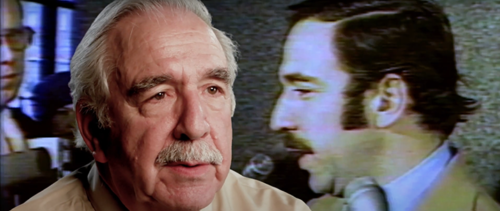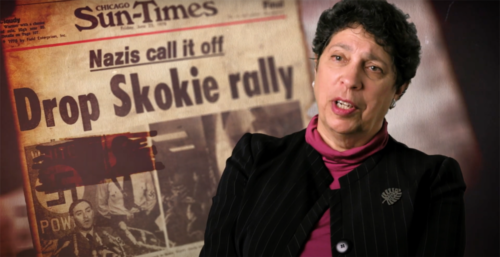As Constitution Day approaches, Annenberg Classroom has released a new film about the First Amendment right of the American people “peaceably to assemble,” the latest in its series of award-winning documentaries about the U.S. Constitution.
It could hardly be more timely. Across America this year, demonstrators have taken to the streets to protest racial injustice. “Freedom of Assembly: National Socialist Party v. Skokie” explores the history of this First Amendment right through the lens of the landmark 1977 U.S. Supreme Court case about a planned march by neo-Nazis in the significantly Jewish Chicago suburb of Skokie, Illinois.
The film is one of the free, high-quality, nonpartisan resources offered to educators, students, and families in time for Constitution Day (Sept. 17) and the new school year by Annenberg Classroom and the Civics Renewal Network, both projects of the Leonore Annenberg Institute for Civics at the Annenberg Public Policy Center (APPC) of the University of Pennsylvania. Featuring interviews from political and legal experts, “Freedom of Assembly” traces how the First Amendment’s freedom of assembly clause has been interpreted to protect nonviolent, community-wide discourse from government censorship, even when the speech involved is unpopular or painful.
A planned demonstration in Skokie
The town of Skokie blocked neo-Nazis from demonstrating because of the emotional toll it would inflict on the town’s residents, who included many Jewish Holocaust survivors. The American Civil Liberties Union (ACLU) provided legal counsel to neo-Nazi Frank Collin, the head of the National Socialist Party of America, arguing that the government should not be able to decide which points of view can be expressed in a public setting.

Though the local and state courts backed Skokie, on appeal the U.S. Supreme Court issued a written decision without even hearing oral arguments. In a per curiam (by the court) opinion, the Court lifted the injunction blocking the demonstration. The Court ruled that because the Illinois courts had blocked the protest while the case was being argued, they had effectively decided against the neo-Nazis from the start. The Court returned the case to the Illinois courts.
Subsequently, 29 members of the National Socialist Party gathered for a demonstration – in Chicago, not Skokie – but their message was drowned out by the voices of over 2,000 counter-demonstrators.
Susan Herman, the current president of the ACLU, said, “[T]here’s always a risk that someone’s going to hear a hateful idea and decide that they agree with it, but the basic idea of democracy is that that’s a risk we have to take.” Eleanor Barrett, associate dean of the University of Pennsylvania Carey Law School, added that the “Skokie case is a real affirmation of a basic, fundamental truth of democracy: that it’s messy.”

The 29-minute film is a project of the Leonore Annenberg Institute for Civics of the Annenberg Public Policy Center in partnership with The Annenberg Foundation Trust at Sunnylands. The film is closed-captioned and comes with a lesson plan. It is available free here for streaming or download.
Annenberg Classroom provides resources for middle and high school students, and it features a library of more than 60 videos, including conversations with Supreme Court justices, interactive games, a guide to the Constitution, and other resources. Among its award-winning films in The Constitution Project are:
- “The 19th Amendment: A Woman’s Right to Vote”
- “Freedom of the Press: New York Times v. United States”
- “Yick Wo and the Equal Protection Clause”
- “Korematsu and Civil Liberties”
The Civics Renewal Network, a consortium of more than 35 nonpartisan, nonprofit organizations dedicated to increasing the quality of civics education, offers a curated collection of resources for Constitution Day. CRN’s Constitution Day Toolkit gives you a variety of activities and lessons for a Constitution Day celebration at your school or at home with your family. Learn more about CRN’s partners.

